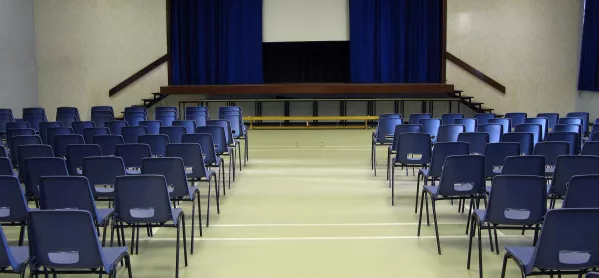When I was in charge of the school council, the students asked whether there could be a wider variety of staff taking assemblies. They wanted to hear from different teachers about their love for their subject or just interesting stories from teachers they admired and respected. The only problem was that there was a huge reluctance to deliver assemblies from those who weren’t already part of the regular ‘stand-up’ assembly scene.
I’ve always found it rather odd that a large number of teachers are uncomfortable about delivering assemblies. We stand up every day in front of students talking confidently about a variety of topics, so why is an assembly any different? Yes, the number of students watching is much larger, there are fellow teachers watching and it could increase workload but there are many reasons for encouraging fellow staff to feel the fear and do it anyway.
It improves your public speaking
Aspiring to be a headteacher? Being able to deliver an inspiring message is crucial to your success and the way other teachers perceive you. If you find you’ve reached that stage without doing assemblies, it’s a pretty daunting place to start learning when so much is expected of you.
It can help you improve your adaptability
It doesn’t matter how much planning you do in preparation for an assembly, things can and will go wrong. The tech doesn’t work or the person you’d roped in to help is suddenly off ill: you have to deal with these problems.
When I was asked to help set up a house system and deliver a launch assembly for one of the houses, I chose some walk-on music that was meant to get the audience pumped up and introduce me as the head of house.
Unfortunately, I chose Leader of the Gang and that very morning of the assembly the news broke about Gary Glitter. Obviously, I had to alter my plans at the very last moment. The experience helped me throughout my teaching career: we all know things rarely run smoothly and you have to be able to adapt.
It improves your visibility
If you want to be known around school, which will often lead to more respect and better control of the corridors, then it helps if you are known by all students and not just by those you teach. Assemblies give you the opportunity to do that. It’s really nice when students you don’t know come up to you and say “Good assembly, Sir!”
It can be cathartic
Sometimes there’s something you need to get off your chest and the beauty of an assembly is that you have a captive audience. You can get angry about the state of the world, whether it be media bias, inequality or climate change. Students love seeing passion and it doesn’t always have to be political. If you’ve read a good book that you genuinely think students should know about, you can come up with an assembly related to that.
I did one with a well-known problematic student related to The Chimp Paradox by Steve Peters. I used her experiences as a way of connecting the book to a wider-school audience and teaching them about how knowing about your chimp can help. That assembly was also great for the self-esteem for the student involved because, for once, she got positive feedback from her contribution.
It can be huge fun
Most of the time when you are asked to deliver assemblies, you can present on any topic that you want and that means you can have great fun. I’ve got students to shout "Gertcha!" when they saw other students littering and once made all the Upper School sing All You Need Is Love when talking about the joys of communal singing and British values.
Often I will speak to students about Danny Wallace’s Yes Man and explain that sometimes it’s just good to have a yes mindset or otherwise you deny yourself opportunities to learn and gain experiences which can be extremely helpful for later in life.
I’m sure most teachers would agree with that sentiment, so why not follow that advice? If you get asked to do an assembly, just say yes and go for it. What’s the worst that can happen?
Gavin Simpson is the head of economics at Dame Alice Owen's School in Hertfordshire. He tweets at @MrGSimpson





